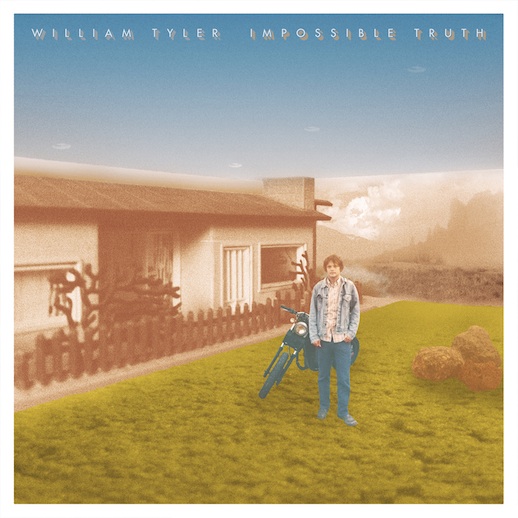WILLIAM TYLER
Impossible Truth
(Merge)
Reviewed by Andy Childs.
Impossible Truth has the feel of a film soundtrack album about it, conjuring up wide-open panoramas and sparse deserted landscapes, as William Tyler confidently picks his way through eight original instrumental pieces and in the process climbs the lofty pedestal on which stands the music of John Fahey, Leo Kottke, Jorma Kaukonen, Sandy Bull, and a handful of other guitarists of similar calibre. Apparently inspired by the unlikely combination of two books – Barney Hoskyns’ Hotel California and Mike Davis’ The Ecology of Fear – Tyler has described it as “my ’70s singer-songwriter record; it just doesn’t have any words.” That may well be but thankfully it has none of the soporific pretentiousness so prevalent in that abused genre. The one thing that both those books would appear to confront is the forces at play in the social unravelling and eventual destruction of self-indulgent and self-regarding communities; in Hoskyns’ book the Laurel Canyon music scene of the early seventies and for Davis a dystopian vision for the future of Los Angeles itself. Tyler has created a musical map for the aftermath of these scenarios – instrumental music of tension, urgency, probing uncertainty, repetition and nostalgia. The misty, post-apocalyptic images in the CD artwork exacerbate this feel. No words are appropriate or necessary.
The music itself sits firmly on the folk/blues axis and to my ears there is a very obvious John Fahey influence as well as a more than likely unwitting Kaukonen/Hot Tuna feel throughout the record. Tyler’s dexterous and consummate guitar playing naturally dominates but Luke Schneider’s pedal steel and Chris Scruggs’ lap steel add texture and the occasional counterpoint melody. The result is a surprisingly satiated sound, and with presumably no overdubs Tyler creates the sound of two or three guitarists at times. His tone rings and chimes and the opening track, Country of Illusion, resonates in Byrds-like fashion. Other tracks, most prominently The Last Residents of Westfall, have the feel of ragas and exploratory drone exercises and Tyler has the knack of creating form and melody in a way that sounds improvisational and then he runs with a theme, pursuing it to its natural conclusion. It’s hypnotic and brilliantly executed if not entirely soothing. I don’t think this is meant to be a record to re-assure or sound comfortable; its implied themes are too unsettling and often the urgency in the playing suggests that time is of the essence. None left to waste on aimless doodling. After forty minutes worth of spellbinding picking and with cinematic images of big washed-out skies and wilderness dancing before your eyes the album closes climactically with the ten-minute The World Set Free, an encapsulating statement, building slowly in intensity to an atonal crescendo and then quickly resolving itself in a pulsing, resigned reversion to order and melody.
Tyler started out, fittingly, on the very wonderful Tompkins Square label which has become a source of some of the most innovative if under-appreciated and obscure guitar playing of the last century. Impossible Truth deserves much more than retrospective acclaim however and Tyler should be recognized now as an artist with rare talent, imagination and a singular vision who has already emulated his distinguished forebears.
Impossible Truth is out now.
We were honoured to have William write for us a short while back. Check it out.
